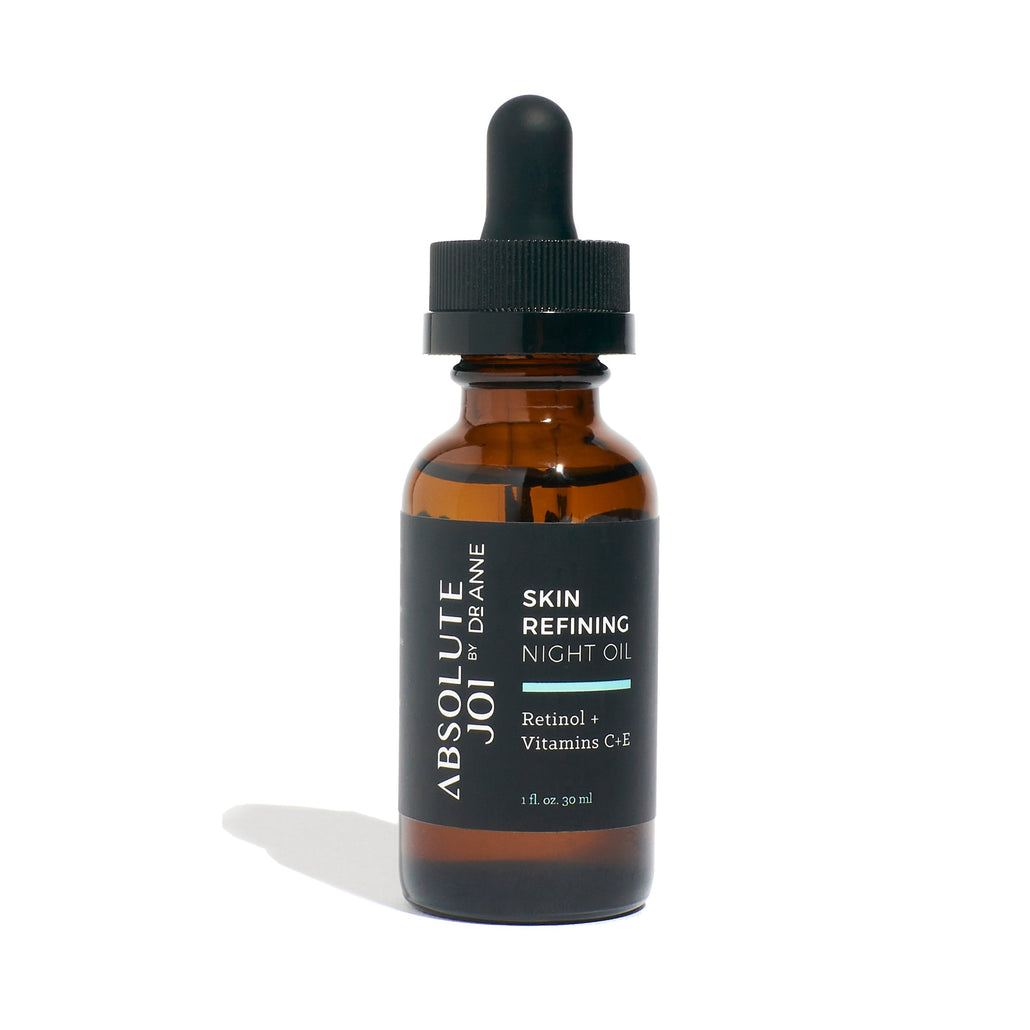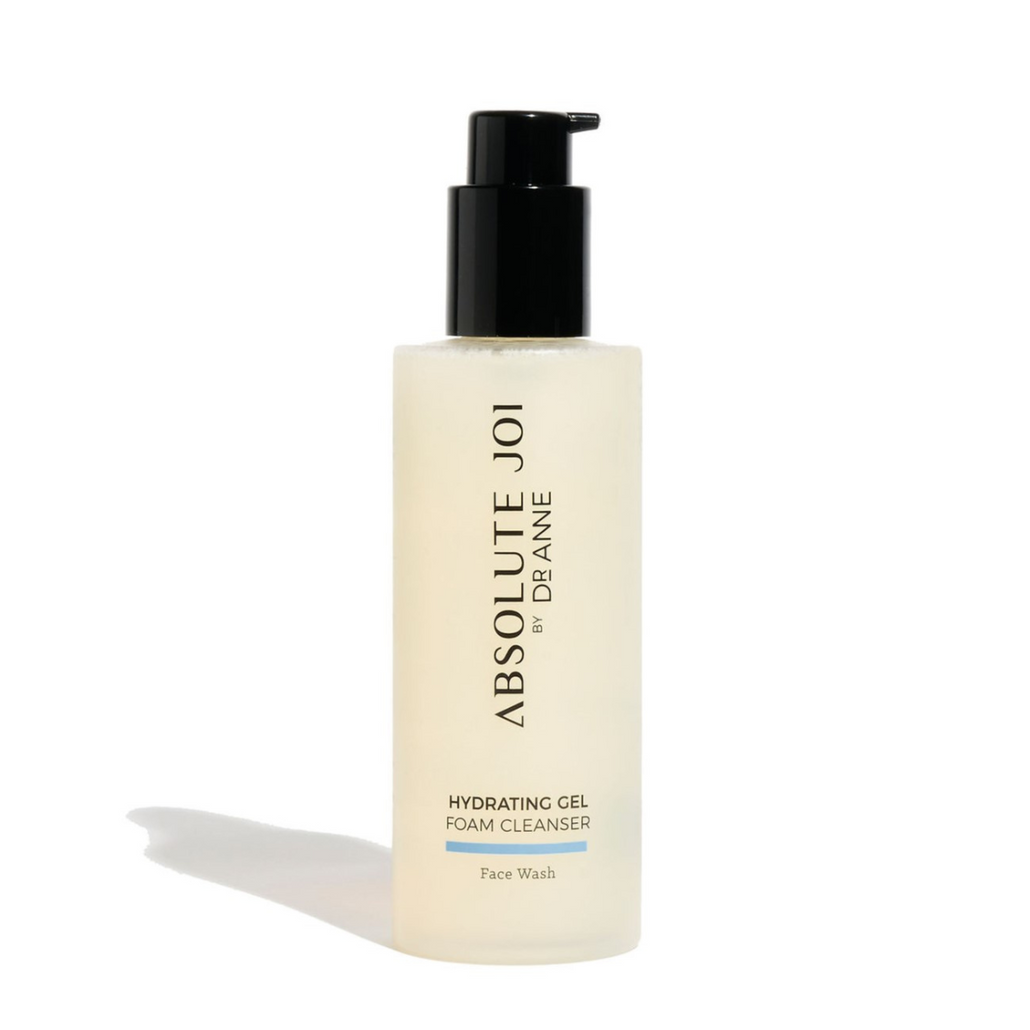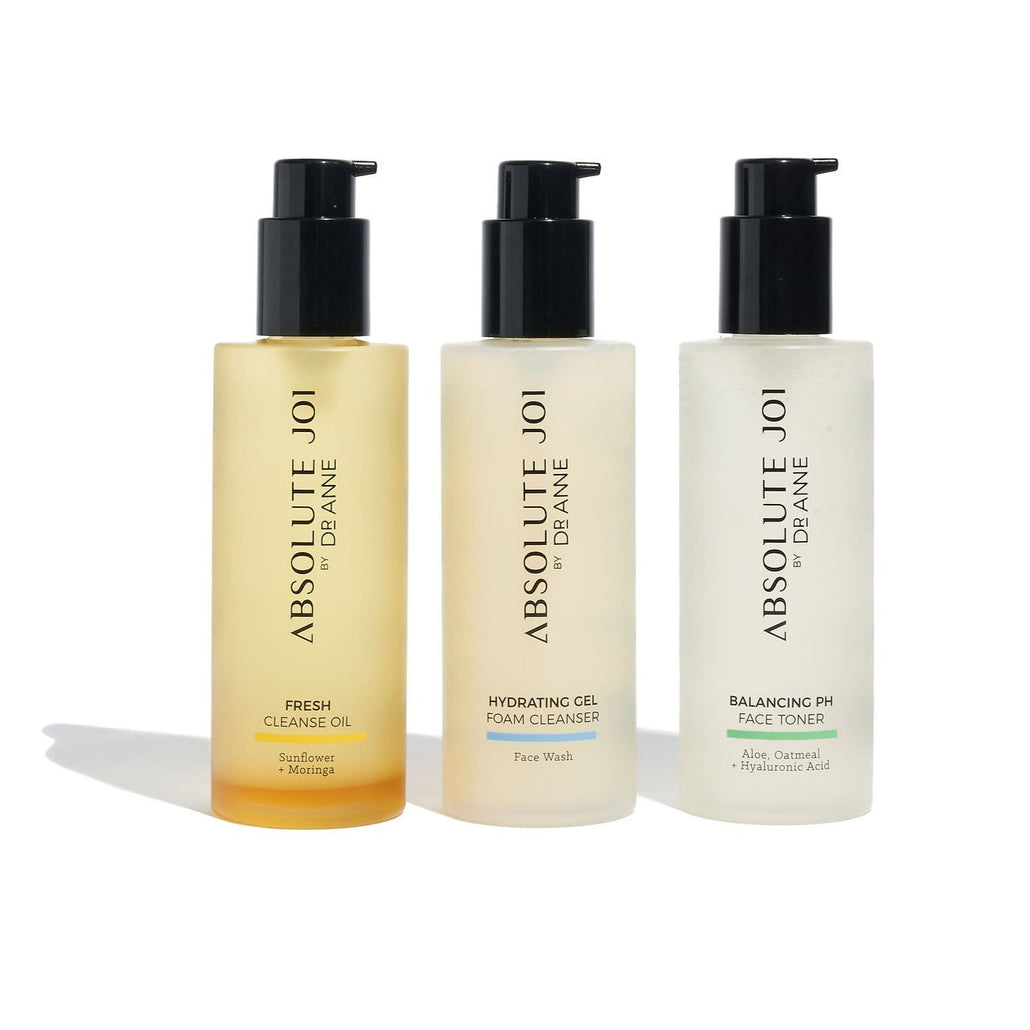What Is Retinol Used for in Skincare?
In This Article →
In This Article
If your current skincare concerns include fine lines, wrinkles, pore size, uneven skin tone and texture, then you may want to consider adding a product with retinol to your routine.
Retinols and retinoids are both derived from Vitamin A. In general, you will find that retinols are available in over-the-counter products, while most retinoids require a prescription from a physician. But the two are related as your skin converts retinol into retinoic acid, the active ingredient in the prescription retinoid creams, which allows retinols to work more gradually, and gently, while still delivering good results. In skincare, retinol is the gold standard for preserving a youthful look for your skin because it is the only scientifically proven ingredient that effectively stimulates the production of collagen. And, if you are like many people dealing with aging and acne, it has the added benefit of being extremely effective against acne. Retinol promotes skin renewal and helps lessen the appearance of fine lines and wrinkles and reverses sun damage. Because it is such an effective product for your skin, retinol is the only ingredient the FDA will allow companies to refer to as “anti-aging” in the U.S.

What Does Retinol Do For Your Skin?
Retinol was first used by dermatologists over 40 years ago to treat acne but they quickly noticed other benefits for their patients’ skin because of how it works. Retinol works by promoting faster skin cell regeneration, which encourages a smoother, more even complexion and less hyperpigmentation. For people with acne, it helps clear pores to prevent breakouts and reduces skin oiliness. The skin turnover also stimulates collagen production for firmer, plumper skin with fewer finelines and wrinkles. As a result, this agile ingredient helps people with:
-
Anti-aging by reducing the appearance of fine lines, wrinkles, and dark marks and by stimulating collagen production for firmer skin;
-
Acne as it unclogs pores, reduces inflammation, and regulates oil production, while also helping to fade acne scars;
-
Brightening by encouraging skin turnover to help even out skin tone, improve the appearance of dark spots and hyperpigmentation for enhanced skin radiance;
-
Smoothing and refinement of skin texture as it promotes exfoliation to reduce roughness anddryness;
-
Firming as aresult of increased collagen production and improved skin elasticity.
Overall, retinol is an excellent ingredient that is highly recommended by skincare professionals and provides a range of benefits to people with different skin types and concerns. However, retinol is also known to cause skin irritation, so it's essential to know how to add it to your skin care routine – especially if you have sensitive skin.

What Does Retinol Do For Your Skin?
Retinol was first used by dermatologists over 40 years ago to treat acne but they quickly noticed other benefits for their patients’ skin because of how it works. Retinol works by promoting faster skin cell regeneration, which encourages a smoother, more even complexion and less hyperpigmentation. For people with acne, it helps clear pores to prevent breakouts and reduces skin oiliness. The skin turnover also stimulates collagen production for firmer, plumper skin with fewer fine lines and wrinkles. As a result, this agile ingredient helps people with:
-
Anti-aging by reducing the appearance of fine lines, wrinkles, and dark marks and by stimulating collagen production for firmer skin;
-
Acne as it unclogs pores, reduces inflammation, and regulates oil production, while also helping to fade acne scars;
-
Brightening by encouraging skin turnover to help even out skin tone, improve the appearance of dark spots and hyperpigmentation for enhanced skin radiance;
-
Smoothing and refinement of skin texture as it promotes exfoliation to reduce roughness and dryness;
-
Firming as a result of increased collagen production and improved skin elasticity.
Overall, retinol is an excellent ingredient that is highly recommended by skincare professionals and provides a range of benefits to people with different skin types and concerns. However, retinol is also known to cause skin irritation, so it's essential to know how to add it to your skin care routine – especially if you have sensitive skin.
Retinol Benefits for Skin
Anti Aging
Acne
Dark Marks
Builds Collagen
How To Use Retinol
Always follow the directions on your retinol products. After cleansing and toning, allow your skin to fully dry for up to 30 minutes as this helps reduce the flakiness many people experience when using retinol. Apply a small pea-sized amount of your retinol product all over your face, focusing on the forehead, cheeks and along your jawline. Avoid letting the product get into your eyes or at the corner of your mouth.
Most retinol brands recommend using their products at night because retinoic acid is photosensitive and will degrade when exposed to sunlight. So, you get none of the benefits if you wear the product during the day. You should also wear sunscreen while using retinols as your skin may become more sensitive to ultraviolet light.
Because retinol encourages new skin cell production, it also speeds up the turnover of old skin cells, which can cause dryness and flakey skin. When you start using retinol, you will need to slowly introduce it into your skin care routine. People with sensitive skin or with darker skin tones should start with a once per week application to avoid irritation that can lead to hyperpigmentation. If your skin is less sensitive, you can start with twice per week, or even every other night. As your skin gets adjusted to the retinol, a process called retinization, you can increase the frequency of use until you can use it every day.
Using a gentle chemical exfoliation once or twice a week will help minimize the peeling that can happen with retinol, especially when you first start to use it. Another option is to use retinol oil. This is especially good for people with sensitive or dry skin as it combines the skin renewal properties of retinol with the hydrating and protective effects of oils. As a last step, apply a gentle moisturizer after the retinol is fully absorbed into your skin to further help prevent dryness.


Can I Use Retinol on Sensitive Skin?
Given all the advice on avoiding skin irritation, you may wonder if people with sensitive skin can use retinol. This is particularly relevant for people with darker skin tones, who often have sensitive skin and want to avoid any irritation that can lead to hyperpigmentation. The answer is yes, people with sensitive can use retinol, but they need to take steps to avoid irritation.
First, instead of jumping into stronger, prescribed retinoids, start with gentler over-the-counter retinols. These preparations use lower concentrations of retinol and are less irritating to skin. Many also use forms of retinol called retinol esters, which are gentler and less irritating to skin. While the full effects of these types of retinol may take longer to become apparent, the good news is they ultimately achieve the same results as higher concentration prescription retinols, but with less irritation to your skin.
Second, always use hydrating and moisturizing products when using retinols. Products with hyaluronic acid help with hydration, and using a good moisturizer once your retinol has been absorbed helps protect skin. A recent social media trend has been sandwiching, which involves using a moisturizer on your skin, then layering your retinol ontop of that, followed with another layer of moisturizer. This may actually dilute the concentration of retinol that is able to get to your skin. But if you are sensitive, then the dilution may be as beneficial as the added protection from double layers of moisture.
Third, look for retinol oils. These oils deliver retinol while providing immediate calming protection to the skin. The oils will have added skin soothing ingredients like omega -3 and omega-6 fatty acids from natural oils or added squalane and ceramides, which all help protect skin and support the skin barrier, making them ideal for sensitive skin.
Fortunately, there are enough options available that most people with sensitive skin can find an option that gives them the benefits of retinol without the irritation.
Can You Use Retinol Twice A Day?
Given all the benefits of retinol, you may be tempted to add it to both your morning and evening skincare routines. However, using retinol twice per day is not recommended for two reasons.
First, the active ingredient, retinoic acid, is photosensitive and breaks down when exposed to sunlight. As a result, your skin will not receive the benefits of retinol if you use it during the day. This is why most retinol products are used at night.
Second, because retinol works by increasing cell turnover and stimulating collagen production, it can cause irritation and dryness, especially if you use too much or use it too often. Getting your skin acclimated to retinol is a gradual process that requires patience and consistency and can't be hurried with more use.
So the bottom line is using retinol twice per day is not recommended. Instead, work your way up to using it once per day at night, and gradually phase it into your routine. For the first two weeks of using the serum, apply it once or twice per week. Then, for the next two weeks apply it every other night and from then on apply it every evening. If your skin starts to get irritated, drop down a step to allow your skin to naturally adjust to the higher levels of vitamin A it is experiencing. Once your skin adjusts, you’ll be enjoying the benefits of smoother, more eventoned and supple skin!

Can You Mix Hyaluronic Acid and Retinol Together?
The goal of combining other skincare ingredients with retinol is either to enhance it’s benefits or to reduce the irritation that can be caused by retinol. Combining retinol with hydrating and skin soothing ingredients is always beneficial, while combining retinol with other active ingredients must be done carefully to avoid additional irritation.
Hyaluronic Acid
Hyaluronic Acid is a hydrating ingredient that attracts water to help hydrate and plump the skin. As a result, it is an excellent ingredient to use with retinol to help prevent any dryness or irritation that may occur. It is best to apply hyaluronic acid before retinol to ensure it penetrates deeply into the skin and provides maximum hydration. Also, any water or moisture on your skin can create more irritation when you apply your retinol. So, it is important to wait 30 minutes to make sure your skin is completely dry when you apply retinol and that any serums, toners, or even water are evaporated before using retinol. TIP: One way to simplify your routine is to use a toner like our Balancing pH Toner with Aloe, Oat and Hyaluronic Acid after you cleanse. It is loaded withhyaluronic acid to help hydrate and is pH balanced to prepare skin for the next steps in your skincare routine – including a retinol product.
Niacinamide
Niacinamide, also known as vitamin B3, is a water-soluble vitamin that can help improve skin texture, reduce the appearance of pores, even out skin tone, and reduce hyperpigmentation. Combining niacinamide with retinol creates a powerful anti-aging and skin-brightening effect. Niacinamide has the added benefit of helping to reduce potential irritation from retinol. As with other ingredients, add them into your skincare routine gradually. Start by using them on alternate nights to avoid any potential irritation, and always wear sunscreen during the day as retinol can make your skin more sensitive to ultraviolet rays. Overall, combining niacinamide with retinol can lead to significant improvements in skin texture, tone, and overall appearance, making it an effective anti-aging and brightening skincare routine.
Exfoliating Acids
Alpha-Hydroxy and Beta-Hydroxy Acids (AHAs and BHAs) help exfoliate skin. You may want to use products with lactic acid, glycolic acid or salicylic acid to minimize skin flakiness with retinol. However, this is a combination that needs to be done carefully. Instead of using these ingredients at the same time, work your way up to using your retinol at night, and your exfoliating acids in the morning. You should start slowly and introduce one type of product (for example, an exfoliating toner) into your skin routine 1-2 times per week for two weeks, then introduce the other type of product (i.e., a retinol serum) starting once per week. Pay attention to how your skin responds to make sure you do not over exfoliate and if it becomes irritated or your natural skin barrier seems unable to keep your skin protected, dial back the exfoliating acids.
Vitamin C
Vitamin C is a powerful antioxidant that helps to brighten skin and protect it from environmental stressors and is a great addition to any skin care routine. There are many different chemical forms for vitamin c and each one interacts with retinol differently. The types of vitamin c that are used in water-based formulas should be applied at different times of the day than your retinol to avoid any potential interactions. Vitamin C is best applied in the morning, while retinol is best used at night.

There are a handful of products on the market that combine retinol and vitamin c into one product. The Retinol Plus Vitamin C Skin Refining Night Oil from AbsoluteJOI uses a gentle retinol ester with a fat-soluble vitamin c in a blend of six natural oils. The oils help calm and nourish skin to prevent dry skin and irritation, while the retinol and vitamin c formulations are non-irritating and work well together in a single, easy to use formula that’s gentle enough to use every day.
Overall, retinol is a powerful skincare ingredient that offers significant benefits for improving skin texture, reducing fine lines and wrinkles, and preventing acne. While it can be used by people with most skin types, pregnant women should avoid using it and other Vitamin A products. Like any new ingredient, it is essential to introduce retinol into your skincare routines gradually, and to patch test your new products. By combining retinol with other active ingredients, you can create a powerful anti-aging skincare routine that targets multiple skin concerns and promotes healthy, glowing skin.

AbsoluteJOI Skincare
by Dr. Anne
AbsoluteJOI is a physician-founded skin care brand with a science-based approach to the needs of people over 35 with all skin types and tones. Developed by physician researcher, Dr. Anne Beal, our products are formulated and tested for sensitive skin, while addressing dyspigmentation, the first sign of aging for many people. Our philosophy is not to focus on anti-aging, but to celebrate all ages and stages and to help our customers age beautifully, while celebrating the confidence and wisdom they’ve gained with time.
Each product combines natural and clinically effective ingredients for healthy skin. We use NO parabens, phthalates, sulphates, or skin bleach. And we use no perfumes or dyes to offer pure and clean products good for all skin types, including sensitive skin.











